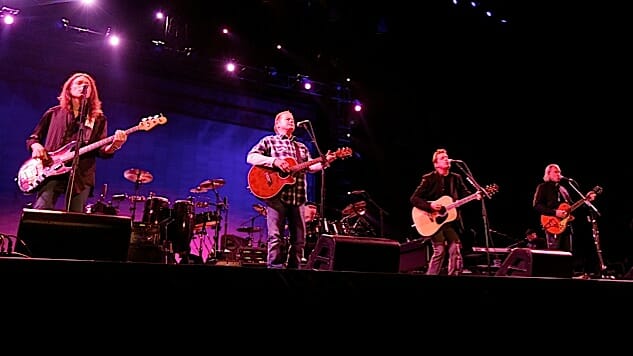Let’s Talk About Hotel California: Great or Terrible?
The Eagles' soft-rock pinnacle remains among the most divisive albums ever.
Photo: Getty Images
Before 2017 comes to a close, and with it the 40th anniversary of Hotel California earning five Grammy nominations (including a Record of the Year trophy for its title track) and instantly becoming one of the best-selling and most divisive albums in rock history, let’s consider the perpetual question of whether The Eagles are actually any good, merely tolerable or quite terrible.
Everyone seems to have an opinion, maybe because The Eagles are undeniably one of the most successful bands of all time—if not the most successful. Incredibly, their first greatest-hits collection came out the year before the release of Hotel California, and now both reside among the 20 best-selling albums ever. Their ubiquitous modern-Bakersfield country sound was barely country, not really rock ‘n’ roll in the rebellious, anarchic sense, and shot through with keyed-up metaphors and allegories about being a rich, drug-addicted American in the post-hippie, pre-yuppie USA. Decades later, even Southern Californians can’t agree on The Eagles. Novelist and Los Angeles native Bret Easton Ellis, always sure-footed in his opinions, couldn’t seem to stop himself from hedging when in 2013 he tweeted in 2013: “The Eagles ‘Hotel California’ album for better or worse is the grand apex of self-pitying Boomer rock. Every track is a sonic masterpiece.” More forceful was Santa Monica stoner Jeffery Lebowski, who simply put it, “I hate the fuckin’ Eagles, man.”
Before The Eagles recorded Hotel California, founding guitarist Bernie Leadon, who had played in country-rock pioneers The Flying Burrito Brothers with Gram Parsons, quit the band and was replaced by Joe Walsh, he of the gleaming guitar riff on “Life in the Fast Lane.” Hotel California consequently found the Eagles at their most rock-ish, diluting much of the country feel that populated their first four studio albums. Parsons, who was more or less the messiah of the country-rock sound that the Eagles had turned into something mass consumable, famously called the band’s early sound “a plastic dry fuck.” But the record-buying public ate it up, sending two singles to No. 1—”New Kid in Town” and “Hotel California”—and buying a million copies within a week of release (which, technically, was in the final days of 1976).
Lyrically, the Eagles hadn’t had much to say beyond the laid-back and love-filled Southern California life that was just one endless “Tequila Sunrise.” With Hotel California, however, things changed. America was in its bicentennial year, they were aiming to create something that at least sounded important. As Glenn Frey told a radio interviewer, “We were listening to a lot of Steely Dan records at the time and we were impressed with the way that they could make junk sculpture lyrics about nothing and make them work into a song.” On the surface, Hotel California brags about success and luxury while being morose about all the vapidness that comes with them. But fans have always scratched deeper, variously interpreting the titular hotel as metaphor for the Church of Satan, an infamous state mental hospital, the entire beautiful, bloated Golden State, and America itself. As lead guitarist Don Felder once recalled, “If you drive into L.A. at night… you can just see this glow on the horizon of lights, and the images that start running through your head of Hollywood and all the dreams that you have, and so it was kind of about that—what we started writing the song about.”
Track two is the far more Eagles-esque “New Kid in Town,” which was the first single from the album. You’re famous. Everyone loves you. But they’ll forget you one day. (“Great expectations, everybody’s watching you.”) Rock stars are the real victims. More accurately, soft-rock stars. But calling this song soft is too kind. It’s Charmin soft.
If “Hotel California” is the Eagles channeling their inner “Stairway to Heaven,” “Life in the Fast Lane” apes Aerosmith.
-

-

-

-

-

-

-

-

-

-

-

-

-

-

-

-

-

-

-

-

-

-

-

-

-

-

-

-

-

-

-

-

-

-

-

-

-

-

-

-








































